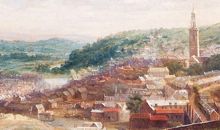2012 Press Releases
27.01.2012
The Lonely Planet Guide 2012 is not the first travel guide to extol the special charms of Cork. A famous 18th century Indian travel writer described how he was attracted to the city by the beauty of its ‘gentle slopes’ and its large river which ‘resembled the Ganges’. The links between Cork and India were celebrated yesterday in UCC (Thursday 26th) at a reception to mark India’s Republic Day for its 60 Indian students and staff many of whom attended in their national dress.
Travel writer, Abu Taleb Khan, recorded in vivid detail his arrival to Cork in 1799. Writing for an elite Indian audience in Persian, Khan observed that: ‘this extensive sheet of water, the verdure of the hills, the comfortable appearance of the town on one side and the romantic cottages of the other, with the formidable aspects of the fort, and so many large ships lying in the harbour, conveyed to mind such sensations as I had never before experienced. [Neither] the Bay of Genoa nor the Straits of Constantinople is to be compared with this’.
-Abu Taleb Khan, The Travels of Mirz Abu Taleb Khan (London, 1814)
One of the more interesting events touched upon by Khan in his account of Cork was his meeting with Dean Mahomet, an Indian emigrant living in Tivoli to the east of the city. Mahomet arrived in Cork in 1784, under the patronage of Godfrey Evan Baker, son of a wealthy Cork merchant and servant in the wealthy East India Company servant.
Apparently Mahomet was far from out of place in cosmopolitan eighteenth century Cork. Some studies indicate that by this time there was already a small community of Indians and Anglo-Indians living in the city, reflecting Cork’s position at the centre of important Atlantic trade routes. Mahomet arrived in Cork during a period coinciding with the emergence of a popular ‘orientalism’, and the corresponding exoticism of the ‘east’. Perhaps because of this, and his relationship as the adopted son of a wealthy merchant family, Mahomet seems to have become a popular figure in city.
Though Cork’s role as an important trading route may have diminished it is still a cosmopolitan city with UCC attracting over 3,000 students from more than 100 countries. The university is building on its historical links with India and its recent national and international accolades to encourage more Indian students to study in Cork. Many of our early graduates in the 19th and early 20th centuries went to India seeking a career and possible adventure. Indeed, the college made it possible for the students and graduates to sit examinations to qualify for positions in the Indian Civil Service, Cadetships in Ceylon (now Sri Lanka) and admission to the Royal Army and Navy Medical Corp and the Indian Medical Service.
UCC graduates also made their mark in Indian academic life. One such was Sir Richard Henry Havelock Charles who was Professor of Medicine and Principal of Calcutta Medical College. He joined the Indian Medical Service on graduating in 1881 and served with distinction as Principal Medical Officer to the Afghan boundary commission before joining the Medical College. Another UCC medic, Sir Edwin John Butler, developed a career in botanical research and after study in London and Paris travelled to India to take up the position as the first Cryptogamic (non-flowering plants) Botanist to the government of India, later becoming Imperial botanist. Engineering graduate, William Good went to India as an Engineer with the Public Works Department. He was the Executive Engineer on a project that constructed the Nadrai Aqueduct Bridge which opened in 1889, the largest structure of its kind in existence.
Staff at the International Education Office at UCC hope that students from India will savour the delights of Cork as described by the Lonely Planet guide and be reminded of the Ganges when they look at the river Lee meandering through the UCC campus.
Picture: John Butts, View of Cork (detail), c 1755 Image courtesy of the Crawford Art Gallery, Cork

